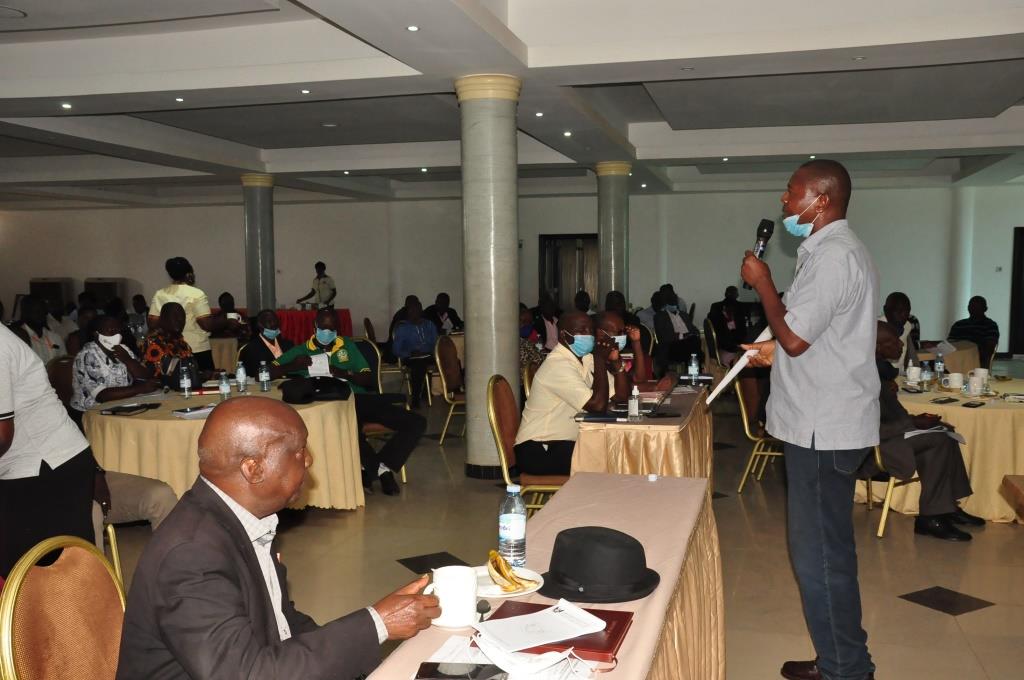Co-operators in Western Uganda have condemned what some referred to as a “confused” regulatory regime resulting from the enactment of various laws meant to regulate the operation of cooperatives, SACCOS in particular, within the country.
The co-operators expressed their discontent during a regional forum on the changing regulatory environment for SACCOs in Uganda. The forum, which was held on Wednesday last week, brought together more than 100 leaders of cooperatives in Western Uganda, including board members, supervisory committee members, members of vetting committees, and other management staff.
According to Dr. Sylvester Ndiroramukama, Chief Executive Officer, Uganda Co-operative Savings and Credit Union (UCSCU), the discussion focused on how to harmonize the different regulations that affect the operations of SACCOs in Uganda.
“We want to bring to the attention of our members the implications of the regulations in the gazetted various sections of the Cooperative Societies Act and the Tier IV Microfinance Institutions and Moneylenders Act, 2016,” Ndiroramukama explained.
Besides the Cooperative Societies Act Cap. 112 by which all cooperatives are governed, SACCOs are now also governed by the Tier IV Microfinance and MoneyLenders Act, 2016, and the Microfinance Deposit-Taking Institutions Act, 2003.
The law further subjects SACCOs to the governance of-the Uganda Microfinance Regulatory Agency (UMRA) and Bank of Uganda, by which they are required to be licensed, in addition to being under the oversight of the Registrar of Cooperative Societies, under the Ministry of Trade Industry and Cooperatives (MTIC).
“Suffocating cooperatives”
Elaborating on the regulatory situation of SACCOs in Uganda, participants at the forum argued that the stringent regulations subjecting the sector to a variety of actors could have the effect of “suffocating” cooperatives.
Ndiroramukama says that as co-operators, they are advocating for a single regulator for the sector, and an independent authority in charge of licensing, regulating, and supervising SACCOs.
“We don’t care who that single regulator would be but what we want is for the SACCOs to enjoy the benefits of backward and forward linkages,” he said.
Ndiroramukama anticipates the collapse of several SACCOs in the country if the issue of multiple regulations in the sector is not sorted out in time.
“Definitely if the status quo remains, SACCOs will die and this is why we are bringing it to the attention of the government that the current laws conflict against each other,” Ndiroramukama said.
Stephen Bongonzya, the vice-chairman of UCSCU, revealed that the different regulators are jostling for control over SACCOS, something he thinks could be injurious to the cooperatives. He too believes the legal regime as it is could spell disaster for some SACCOs.
“The Microfinance Deposit-Taking Institutions Act regulates companies meaning that some of the SACCOs that cross will automatically become companies, and you can never be allowed to slide back. In case of issues, Bank of Uganda will either advise you to merge, be bought or end up collapsing, which is the reason we are insisting that they remain as SACCOs,” Bongonzya explained.
Sort us out, or else…
Some of the attendees at the forum threatened to stage a strike if the law is not rectified to have a single regulator for all cooperatives.
“We had several discussions and made recommendations, but our submissions were not considered when amending the Act? Are we now orphans? If we don’t have any ministry that is concerned for our affairs, this is the right time to start a strike to retain our identity as SACCOs,” a tough-talking staffer of Kitaga SACCO fumed.
However, the CEO of UCSCU, urged the co-operators to desist from any talk of violence, saying they will use non-violent processes to bring about the desired harmony within the cooperative laws.
“We are not going to strike because as co-operators we don’t believe in violence; we are democratic and law-abiding institutions, which is why we use the approach of engaging and petitioning, which doesn’t involve using excessive force or violence,” Ndiroramukama said.
Rev. Can. Duncans Mugumya, the Board Chairman, Jubilee SACCO (West Ankole Diocese), also urged calm, calling instead for engagement with lawmakers, saying, “The existing law was passed by human beings and can just as well be changed be the same.”
Prominent among the issues raised by participants were the number of licensing and supervisory agencies, and the mix-up of funds, among others. that were petitioned to the speaker of parliament.
The UCSCU officials reported that they had petitioned Parliament about the issues of concern to cooperatives.
“We have raised the contradictions with the Office of the Speaker of Parliament through a petition, and she has already written to the relevant committees of ministries to ensure that they harmonize these inconsistencies in the two laws,” Bongonzya said.
Spilled milk
However, a cross-section of the co-operators in attendance likened their peers’ complaints to crying over spilled milk, saying the time for protest is now long past, given that the offending law is already in place.
“I think we should comply with the law. We should have defied when it was still in preparation, but now that it’s already amended it’s a challenge to overcome. We can instead adopt amicable means to resolve the gaps within it,” argued Charles Muramuzi, one of the participants.
Muramuzi also opined that some of the resistance to the new legal regime is born of fear by SACCOs that have till now been non-compliant with existing regulation.
“The problem is that we are fearing change vis-à-vis compliance because these new regulations are very strict with regard to compliance, and yet we are not doing what we are supposed to be doing as SACCOs. But if we accept these laws, then we can benchmark and grow like any other successful cooperatives,” he said.
Buy your copy of thecooperator magazine from one of our country- wide vending points or an e-copy on emag.thecooperator.news
